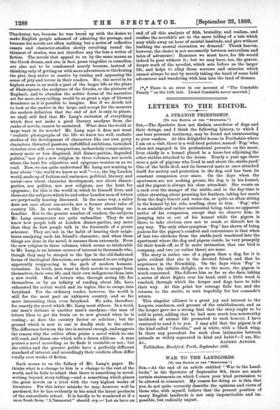LETTERS TO THE EDITOR.
A STRANGE FRIENDSHIP.
[To THE EDITOR OP THE "SPECTATOR."' SIR,—The Spectator does not disdain anecdotes of dogs and their doings, and I think the following history, to which I can bear personal testimony, may be found not uninteresting to your readers. At this delightful house in Perthshire where I am on a visit, there is a well-bred pointer, named Fop,' who, when not engaged in his professional pursuits on the moor, lives chiefly in a kennel placed in a loose-box adjoining the other stables attached to the house. Nearly a year ago there were a pair of pigeons who lived in and about the stable-yardl One of the birds died, and its bereaved mate at once attached itself for society and protection to the dog, and has been its constant companion ever since. On the days when the sportsmen are not seeking grouse, the dog is in his kennel, and the pigeon is always his close attendant. She roosts on a rack over the manger of the stable, and in the day-time is either strutting about preening her feathers, taking her meals from the dog's biscuit and water-tin, or quite as often sitting
in the kennel by his side, nestling close to Fop,' who is an amiable and rather sentimental being, takes no apparent notice of his companion, except that we observe him, in jumping into or out of his kennel while the pigeon is there, to take obvious care not to crush or disturb her in any way. The only other symptom Fop' has shown of being jealous for the pigeon's comfort and convenience is that when of late two chickens from the stable-yard wandered into the apartment where the dog and pigeon reside, he very promptly bit their heads off, as if in mute intimation that one bird is company, and two (or rather three) are none.
The story is rather one of a pigeon than a dog, for it is quite evident that she is the devoted friend, and that he acquiesces in the friendship. On the days when Fop' is taken, to his infinite delight, on to the moor, the pigeon is much concerned. She follows him as far as she dare, taking a series of short flights over his head, until a little wood is reached, through which the keeper and dogs have to take their way. At this point her courage fails her, and she returns to the stable, to wait hopefully for her comrade's return.
This singular alliance is a great joy and interest to the keepers, coachmen, and grooms of the establishment, and as the keeper gave me a strong hint that the story ought to be told in print, adding that he had seen much less noteworthy incidents of animal life promoted to such honour, I have ventured to send it to you. I may add that the pigeon is of the kind called " Jacobin," and is white, with a black wing. Is there any precedent for such close intimacies between animals so widely separated in kind and habit ?—I am, Sir, Bankfoot, Perth, September 18th.


































 Previous page
Previous page